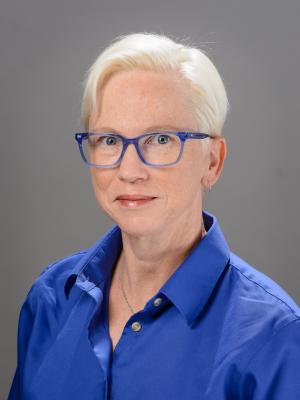Beginning therapists benefit greatly from self-awareness of personal beliefs, potential biases, and interpersonal style. With an emphasis on the importance of a strong therapeutic relationship, I aim to teach basic psychotherapy techniques that exist independently of theoretical orientation. More advanced students are encouraged to follow their strengths when considering options for intervention. Each topic taught is done so with consideration of relevant stakeholders, such as collaborating health service professionals, persons collateral to treatment, and associated colleagues. I ask that students stay vigilant to the impact of rapidly changing technology and healthcare systems. Lastly, I insist that all the tremendous advances in evidence-based treatments be placed in the client's life context.
Byrne, Colleen
Bio
Dr. Byrne joined the UMCP faculty as the Psychology Clinic Director in 2001. Dr. Byrne oversees clinical training in psychotherapy and assessment for doctoral students in the clinical psychology program during their practica in the Psychology Clinic. After undergraduate work at the University of Virginia, Dr. Byrne received her PhD in Clinical Psychology from Emory University. She completed her internship at the James A. Haley Veterans Hospital in Tampa, Florida and pursued postdoctoral training with children and adolescents at the Beyond Words Center for Social Skills Training in Atlanta, Georgia. Dr. Byrne served as an adult psychologist and head of the child team at East Ridge Community Mental Health Center in Martinsburg, West Virginia. Since 2005, Dr. Byrne has served continuously on the Executive Committee for the Association of Psychology Training Clinics (APTC) including a term as President. Dr. Byrne has been active member of the Maryland Psychological Association, serving 3 terms on the Continuing Education Committee and 3 terms on the Ethics Committee with one term as Chair. Currently she holds professional services roles as Chair of the Council of Chairs of Training Councils (CCTC, 2025-2027) and Chair-Elect of the National Register of Health Service Psychologists (NRHSP, 2023-2027). She holds active licenses in Virginia and Maryland as well as an inter-jurisdictional license through PSYPACT.
Degrees
Emory University; 1998 Clinical Psychology - PhD
Emory University; 1996 Clinical Psychology - MA
University of Virginia; 1992 Psychology - BA
Areas of Interest
Clinical Supervision
Professional Ethics
Interpersonal and Cognitive-Behavioral Psychotherapy
Mental Health Administration & Consultation


